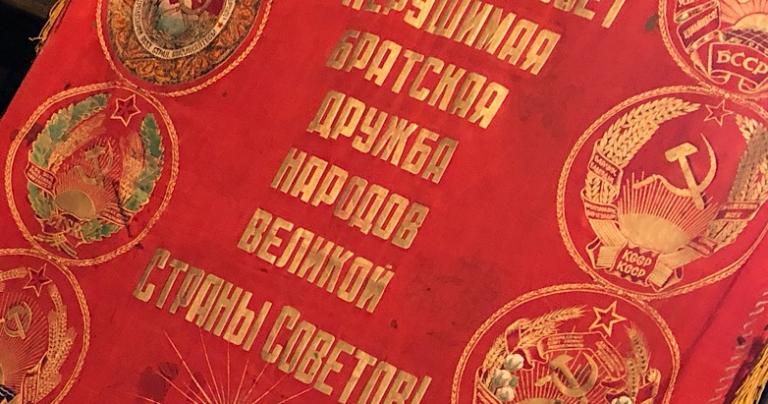 There are a few rulers so corrupt, think Stalin or Hitler, that justice for them will necessitate ending their lives so they cannot harm others. If they are allowed to continue, the tyrants further damn their own souls. Stopping an irredeemable tyrant is a severe mercy. They are, so far as human justice is concerned, beyond hope or redemption.
There are a few rulers so corrupt, think Stalin or Hitler, that justice for them will necessitate ending their lives so they cannot harm others. If they are allowed to continue, the tyrants further damn their own souls. Stopping an irredeemable tyrant is a severe mercy. They are, so far as human justice is concerned, beyond hope or redemption.
But the tractors!
Even the worst tyrants did good deeds, but the good done does nothing to justify the regime. I was recently in a former Soviet “republic” and saw a museum built to honor the victims of the evil Soviet regime. There was no nostagia for the bad old days in this display. Soviet communism killed kids if Dad or Mom had the wrong job.
While running up a world class body count, this mass murdering gang of thugs did some good. Nobody opposes the schools built, though the propaganda inside them was ugly. The hospitals did not just torture dissidents, but also provided health care for the masses. Good was done, roads built, tractors distributed, but the regime was built on a trajectory toward injustice. When I was a young man, otherwise decent people would praise the Soviet Union for the good works and minimize the concentration camps. This was moral blindness: a new tractor for the survivors does not balance out murdering members of the village. (Sure we killed Alyosha, but look at this combine!)
Some evidence suggests that all the suffering under communism slowed down social progress that would have been made if the Tsarist regime had simply continued. Education, medical care, and wealth were expanding rapidly under Tsar Nicholas II before World War I. A parliament was gaining a greater say in governing. World War I ruined many nations, including Russia, but as an ally, if Russia could have endured one more year, she might have reaped the fruits of victory. Imagine a world with no Red Terror next to Germany, frightening the defeated Germans into joining the Brown Shirts to stop the Reds.
No good deeds in a bad regime can buy a just person’s support.
None.
We might prefer one bad regime to another out of practical concerns, but that is different than support. No rulers are perfect, but to gain a Christian’s support, the trajectory of the social order must be toward justice. For much of the history of the Orthodox Church in lands such as Georgia, one of the oldest Christian nations, the government has been bad. The Soviets ruled as barbarian conquerors and persecuted the church. To make the point that the regime could not be whole heartedly supported, a recently canonized Georgian saint burned a banner of Lenin on his “feast day.” This led to a stretch in the gulag, but reminds all Christians that a refusal to say “Caesar is Lord” when Caesar is no good is a Christian tradition that can make a man a saint!
Yet over eighty years of living under Communism, or hundreds of years under Islamic rule in Syria, Christians mostly must do the best they can. There is a place for the heroic statement of principle, but most of the faithful must go on being faithful. One way to do so is to praise the good the regime does while not ignoring the bad. We might also decide that one bad regime is preferable to another bad one and so offer our help to the better thugs without offering praise or support.
This is hard to do. Syncophancy is always a temptation, but so is mere hotheadness or the Utopianism that can lead to destruction. Christians who have lived hundreds of years under governments where all the parties hate them with varied degrees of hatred know that some hatred is more tolerable than others.
How then should we live?
Finding the Element of Justice
Plato, that father of philosophy, offers us some good guidance. In his masterwork Republic, he has Socrates talking to young men in a city so corrupt that education itself has become a means of injustice. He provides Socrates one of those teachers who defends the unjust system as good and Socrates tries with mixed results to undo the damage this bad teacher is doing. One thing Socrates points out is that if rulers are to survive for any length of time (like the Soviets did or the Islamic conquerors) they must do much justice in the midst of their (general) injustice:
So there must have been some element of justice in each which prevented them from treating one another the way they treated their victims. It is this element of justice which must have brought them that degree of success they were able to achieve. They must have been only half-corrupted when they initiated their misdeeds, since utter villains are completely unjust and would therefore be totally incapable of effective joint action.
This is to underscore the point: for the regime to function, it must be somewhat just. A Christian must stand in prophetic tension to an unjust regime and some will be called to martyrdom. Most of us, however, will be called to quietly make our opinion known by a lack of cooperation or enthusiasm. Christians in Soviet times mastered the art of clapping, as one had to do when the Leader spoke, but without enthusiasm. A Christian did not join the Party, but was willing to help with good projects that the regime might start in areas such as education, medical care, or the economy.
We sometimes are governed by villains and we would get rid of them if we could. When we cannot, Christians mix civil disobedience (when it is feasible) with martyrdom and grudging cooperation. This side of Paradise that is the common lot of the faithful in most places at most times.
———————————————-
*I begin an informal summer reading of Republic using Scott/Sterling (a new translation for me). Part 1. Part 2. Part 3. Part 4. Part 5. Part 6. Part 7. Part 8. Part 9. Part 10. Part 11. Part 12. Part 13. Part 14. Part 15. Part 16. Part 17. Part 18. Part 19. Part 20. Part 21. Part 22. Part 23. Part 24. Part 25. Part 26. Part 27. Part 28. Part 29. Part 30. Part 31. Part 32. Part 33. Part 34. Part 35. Part 36. Part 37. Part 38. Part 39. Part 40. Part 41. Part 42. Part 43. Part 44. Part 45. Part 45.5. Part 46. Part 47. Part 48. Part 49. Part 50.












